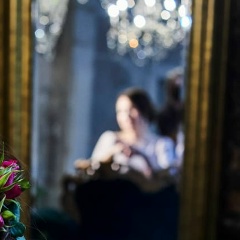Просто не могу не написать об этом - сегодня день снятия блокады Ленинграда. Это очень трепетная и важная дата в истории нашего города и нашей страны. Сегодняшняя утренняя газета была конечно посвящена этому событию - я читала и слезы наворачивались на глаза. Раньше я не была такой сентиментальной...
Насколько тяжело нам сегодня представить, как это было на самом деле.И я шла утром на работу и думала - в воспоминаниях блокадников упоминается о том, что в домах оставались с довоенного времени пачки клея, о том, что люди обдирали обои и варили их, потому что там был клейстер... Трудно себе это представить. У меня сегодня дома запасов хранится столько, что если не дай бог, я буду изолирована в там, то продуктов мне хватит на несколько месяцев - на зиму точно. Десятки банок с вареньем, консервы и соления, соки, крупы и макароны, сгущенное молоко - все это хранится всегда с запасом. Да, конечно, сейчас такое изобилие всего, так много продуктов выкидывается, но эта привычка хранить дома запас еды прошла сквозь два поколения. Моя бабушка так вообще покупает всего помногу (притом что живет она одна и ест мало) - появился дешевый сахар в магазине - она берет сразу 10 кг, яйца дешевые - сразу 6 десятков! и т.д. И она не может выкинуть ничего - даже заплесневелый хлеб или сыр, листик зелени, полусгнившее яблоко! Хотя она не была жительницей блокадного Ленинграда, она жила в Казахстане во время войны. В 1941 году ей было 12 лет и с самого начала войны она работала на полях. Еды тоже не хватало, хотя было свое хозяйство - все отдавали на фронт. А дома варили суп из картофельных очисток, и только на день рождения одного из детей (детей в семье было много), мама подзывала именинника и дарила ему прибереженное яичко! Представляете - вот подарок на день рождения!
А вот отрывок из воспоминаний Дмитрия Лихачева - жителя блокадного Ленинграда - «Трупы умерших от истощения почти не портились: они были такие сухие, что могли лежать долго. Семьи умерших не хоронили своих: они получали на них карточки. Страха перед трупами не было, родных не оплакивали — слез тоже не было. В квартирах не запирались двери: на дорогах накапливался лед, как и по всей лестнице (ведь воду носили в ведрах, вода расплескивалась, ее часто проливали обессиленные люди, и вода тотчас замерзала). Холод гулял по квартирам. Так умер фольклорист Калецкий. Он жил где-то около Кировского проспекта. Когда к нему пришли, дверь его квартиры была полуоткрыта. Видно было, что последние жильцы пытались сколоть лед, чтобы ее закрыть, но не смогли. В холодных комнатах, под одеялами, шубами, коврами лежали трупы: сухие, не разложившиеся. Когда умерли эти люди?"
Сегодня моей трехлетней дочке в садике рассказывали какой сегодня день, и я рассказала ей и показала кадры видеохроники. Она не все поняла, и уж точно не все осознала, но вывод сделала такой - это очень грустно.
Мы должны помнить об этом дне нашей истории и сохранить эту память в сердцах наших детей. Помнить, чтобы никогда больше не позволить этому повториться! Нести мир, свет, любовь, прощение и гармонию. И всегда оставаться людьми.
Насколько тяжело нам сегодня представить, как это было на самом деле.И я шла утром на работу и думала - в воспоминаниях блокадников упоминается о том, что в домах оставались с довоенного времени пачки клея, о том, что люди обдирали обои и варили их, потому что там был клейстер... Трудно себе это представить. У меня сегодня дома запасов хранится столько, что если не дай бог, я буду изолирована в там, то продуктов мне хватит на несколько месяцев - на зиму точно. Десятки банок с вареньем, консервы и соления, соки, крупы и макароны, сгущенное молоко - все это хранится всегда с запасом. Да, конечно, сейчас такое изобилие всего, так много продуктов выкидывается, но эта привычка хранить дома запас еды прошла сквозь два поколения. Моя бабушка так вообще покупает всего помногу (притом что живет она одна и ест мало) - появился дешевый сахар в магазине - она берет сразу 10 кг, яйца дешевые - сразу 6 десятков! и т.д. И она не может выкинуть ничего - даже заплесневелый хлеб или сыр, листик зелени, полусгнившее яблоко! Хотя она не была жительницей блокадного Ленинграда, она жила в Казахстане во время войны. В 1941 году ей было 12 лет и с самого начала войны она работала на полях. Еды тоже не хватало, хотя было свое хозяйство - все отдавали на фронт. А дома варили суп из картофельных очисток, и только на день рождения одного из детей (детей в семье было много), мама подзывала именинника и дарила ему прибереженное яичко! Представляете - вот подарок на день рождения!
А вот отрывок из воспоминаний Дмитрия Лихачева - жителя блокадного Ленинграда - «Трупы умерших от истощения почти не портились: они были такие сухие, что могли лежать долго. Семьи умерших не хоронили своих: они получали на них карточки. Страха перед трупами не было, родных не оплакивали — слез тоже не было. В квартирах не запирались двери: на дорогах накапливался лед, как и по всей лестнице (ведь воду носили в ведрах, вода расплескивалась, ее часто проливали обессиленные люди, и вода тотчас замерзала). Холод гулял по квартирам. Так умер фольклорист Калецкий. Он жил где-то около Кировского проспекта. Когда к нему пришли, дверь его квартиры была полуоткрыта. Видно было, что последние жильцы пытались сколоть лед, чтобы ее закрыть, но не смогли. В холодных комнатах, под одеялами, шубами, коврами лежали трупы: сухие, не разложившиеся. Когда умерли эти люди?"
Сегодня моей трехлетней дочке в садике рассказывали какой сегодня день, и я рассказала ей и показала кадры видеохроники. Она не все поняла, и уж точно не все осознала, но вывод сделала такой - это очень грустно.
Мы должны помнить об этом дне нашей истории и сохранить эту память в сердцах наших детей. Помнить, чтобы никогда больше не позволить этому повториться! Нести мир, свет, любовь, прощение и гармонию. И всегда оставаться людьми.
I just can’t help but write about it - today is the day of lifting the blockade of Leningrad. This is a very reverent and important date in the history of our city and our country. Today's morning newspaper was certainly devoted to this event - I read and tears came to my eyes. I used to not be so sentimental ...
It’s hard for us to imagine today how it really was. And I went to work in the morning and thought - in the memoirs of the blockade it is mentioned that there were packs of glue in the houses from the pre-war time, that people peeled wallpapers and cooked them, because there was a paste ... It's hard to imagine it. Today I have so many stocks at home that, if God forbid, I will be isolated in there, then I will have enough products for several months - for the winter for sure. Dozens of jars of jam, canned food and pickles, juices, cereals and pasta, condensed milk - all this is always stored with a margin. Yes, of course, now there is such an abundance of everything, so many products are being thrown out, but this habit of storing food at home has passed through two generations. My grandmother generally buys a lot of things (despite the fact that she lives alone and eats little) - there was cheap sugar in the store - she takes 10 kg immediately, eggs are cheap - immediately 6 dozen! etc. And she cannot throw anything - not even moldy bread or cheese, a leaf of greenery, a half-rotten apple! Although she was not a resident of the besieged Leningrad, she lived in Kazakhstan during the war. In 1941, she was 12 years old and from the very beginning of the war she worked in the fields. Food was also not enough, although there was its own farm - everyone was given to the front. And at home they cooked soup from potato peelings, and only on the birthday of one of the children (there were many children in the family), my mother called the birthday boy and gave him a preserved egg! Imagine - this is a birthday present!
And here is an excerpt from the memoirs of Dmitry Likhachev - a resident of the besieged Leningrad - “The corpses of those who died from exhaustion almost did not deteriorate: they were so dry that they could lie for a long time. Families of the dead did not bury their own: they received cards on them. There was no fear of the corpses, relatives were not mourned - there were no tears either. The doors did not lock in the apartments: ice accumulated on the roads, as well as along the whole staircase (after all, water was carried in buckets, water was splashing, it was often spilled by exhausted people, and the water immediately froze). Cold walked around the apartments. So the folklorist Kaletsky died. He lived somewhere near Kirovsky Avenue. When they came to him, the door of his apartment was half open. It was evident that the last tenants tried to break the ice to close it, but could not. In cold rooms, under blankets, fur coats, carpets, lay corpses: dry, not decomposed. When did these people die? "
Today, my three-year-old daughter in kindergarten was told what day it is, and I told her and showed video footage. She didn’t understand everything, and certainly she didn’t understand everything, but she came to the conclusion that it’s very sad.
We must remember this day of our history and preserve this memory in the hearts of our children. Remember to never let this happen again! Carry peace, light, love, forgiveness and harmony. And always remain human.
It’s hard for us to imagine today how it really was. And I went to work in the morning and thought - in the memoirs of the blockade it is mentioned that there were packs of glue in the houses from the pre-war time, that people peeled wallpapers and cooked them, because there was a paste ... It's hard to imagine it. Today I have so many stocks at home that, if God forbid, I will be isolated in there, then I will have enough products for several months - for the winter for sure. Dozens of jars of jam, canned food and pickles, juices, cereals and pasta, condensed milk - all this is always stored with a margin. Yes, of course, now there is such an abundance of everything, so many products are being thrown out, but this habit of storing food at home has passed through two generations. My grandmother generally buys a lot of things (despite the fact that she lives alone and eats little) - there was cheap sugar in the store - she takes 10 kg immediately, eggs are cheap - immediately 6 dozen! etc. And she cannot throw anything - not even moldy bread or cheese, a leaf of greenery, a half-rotten apple! Although she was not a resident of the besieged Leningrad, she lived in Kazakhstan during the war. In 1941, she was 12 years old and from the very beginning of the war she worked in the fields. Food was also not enough, although there was its own farm - everyone was given to the front. And at home they cooked soup from potato peelings, and only on the birthday of one of the children (there were many children in the family), my mother called the birthday boy and gave him a preserved egg! Imagine - this is a birthday present!
And here is an excerpt from the memoirs of Dmitry Likhachev - a resident of the besieged Leningrad - “The corpses of those who died from exhaustion almost did not deteriorate: they were so dry that they could lie for a long time. Families of the dead did not bury their own: they received cards on them. There was no fear of the corpses, relatives were not mourned - there were no tears either. The doors did not lock in the apartments: ice accumulated on the roads, as well as along the whole staircase (after all, water was carried in buckets, water was splashing, it was often spilled by exhausted people, and the water immediately froze). Cold walked around the apartments. So the folklorist Kaletsky died. He lived somewhere near Kirovsky Avenue. When they came to him, the door of his apartment was half open. It was evident that the last tenants tried to break the ice to close it, but could not. In cold rooms, under blankets, fur coats, carpets, lay corpses: dry, not decomposed. When did these people die? "
Today, my three-year-old daughter in kindergarten was told what day it is, and I told her and showed video footage. She didn’t understand everything, and certainly she didn’t understand everything, but she came to the conclusion that it’s very sad.
We must remember this day of our history and preserve this memory in the hearts of our children. Remember to never let this happen again! Carry peace, light, love, forgiveness and harmony. And always remain human.

У записи 8 лайков,
1 репостов.
1 репостов.
Эту запись оставил(а) на своей стене Мария Васильева





























